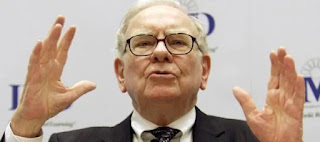 |
| Warren Buffett says these are the best businesses to own — 3 examples from Berkshire's portfolio |
While we're constantly bombarded with confusing investment mumbo jumbo, we must never forget that, for the most part, companies exist for one primary reason: to take capital from investors and make a return on it. For this reason, it makes sense for investors to look for companies with enduring competitive advantages that are capable of consistently delivering high returns on investments.
As Warren Buffett, CEO of Berkshire Hathaway, once said, "The best company to own is one that can deploy large amounts of incremental capital at very high prices at very high rates of return. With that in mind, here are three Berkshire holdings with double-digit returns on invested capital.
Moody's (MCO)
With returns on invested capital consistently in the mid-20% range, credit rating leader Moody’s leads off our list.
Moody’s shares held up incredibly well during the height of the pandemic and are up nearly 220% over the past five years, suggesting that it’s a recession-resistant business worth betting on.
Specifically, the company’s well-entrenched leadership position in credit ratings, which leads to outsized returns on capital, should continue to limit Moody’s long-term downside
Moreover, Moody’s has generated about $2.4 billion in trailing twelve-month free cash flow. And over the first three quarters of 2021, the company has returned $975 million to shareholders through share repurchases and dividends.
As of Q3 2021, Berkshire holds more than 24.6 million shares of Moody’s worth just under $8.8 billion. Moody’s has a dividend yield of 0.7%.
Apple (AAPL)
Next up, we have consumer technology gorilla Apple, which boasts a five-year return on invested capital of 28%, much higher than that of rivals like Nokia (-3%) and Sony (12%).
Even in the cutthroat world of consumer hardware, the iPhone maker has been able to generate outsized returns due to its loyalty-commanding brand and high switching costs (the iOS experience can only be had through Apple products).
And with the company continuing to penetrate emerging markets like India and Mexico, Apple’s long-term growth trajectory remains healthy.
In the most recent quarter, Apple’s revenue jumped 29% to $83.4 billion. The company also returned over $24 billion to shareholders.
The stock currently sports a dividend yield of just 0.5%, but with a buyback yield of 3%, Apple is doling out more cash to shareholders than you might think.
It's no wonder that Apple is Berkshire's largest public holding, owning more than 887 million shares in the tech giant worth roughly $125.5 billion.
Procter & Gamble (PG)
Rounding out the list is consumer staples giant Procter & Gamble, with a solid five-year average return on invested capital of 13.5%.
Berkshire held 315,400 shares at the end of Q3, worth around $44 million at today’s price. While that’s not a big position by Berkshire standards, something does make P&G stand out: the ability to deliver rising cash returns to investors through thick and thin.
The company offers a portfolio of trusted brands like Bounty paper towels, Crest toothpaste, Gillette razor blades and Tide detergent. These are products households buy on a regular basis, regardless of what the economy is doing.
In April, P&G’s board of directors announced a 10% increase to the quarterly payout, marking the company’s 65th consecutive annual dividend hike.
P&G share currently offer a dividend yield of 2.2%.
Source: Yahoo News
Comments
Post a Comment